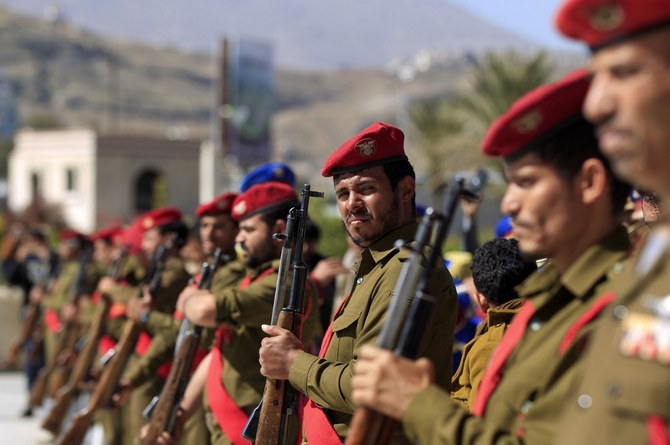LONDON: Yemen’s Houthi militia behaves like a terrorist organization and is deepening its relationship with Iran’s elite military units, a senior US official said on Thursday.
The comments came as the US issued new sanctions against Houthi officials for human rights abuses and the Trump administration continued its deliberations on whether to designate the militants as a terrorist group.
The militia sparked the Yemen conflict in 2014 when it seized the capital Sanaa from the internationally recognized government and now controls much of northwest Yemen.
Timothy Lenderking, deputy assistant secretary of state for Arabian Gulf affairs, said he could not comment on internal deliberations about a possible designation, but added: “The Houthis do things that are akin to the behavior of a terrorist organization.”
Speaking at a press briefing for regional media, Lenderking listed the Houthi actions that the US sees as most terrorist in nature and warned that Iran’s Islamic Revolutionary Guard Corps (IRGC) was increasingly helping fund and train the militants.
“They target civilians and civilian infrastructure, they use kidnapping as a tool of war and, if anything, they seem to be deepening their relationship with the IRGC, which from our point of view is a designated terrorist organization,” he said.
Lenderking added that the Houthi’s use of child soldiers, the barring of experts seeking to assess a stricken oil tanker, and the obstruction of aid operations in Yemen were “highly distasteful activities but not specifically terrorist.”
He said these activities would have to stop if the Houthis wanted to be seen as a legitimate political actor inside the country.
Some aid agencies have warned that designating the Houthis as terrorists would further hamper their operations in Yemen, which is suffering one of the world’s worst humanitarian disasters.
Lenderking’s comments come after a flurry of diplomatic activity between the US and Arab Gulf states in recent months.
He said the US is working with Gulf countries to counter the Iranian threat in the region, which includes fueling the war in Yemen.
Officials have also been looking to reassure parties in the region amid concerns that the switch to the Joe Biden administration next month will lead to an easing of the “maximum pressure” campaign against Iran.
Under Donald Trump, the US pulled out of a landmark deal to curtail Tehran’s nuclear program and ramped up sanctions. Many in the region believe the 2015 agreement gave the Iranian regime political and financial muscle to pursue an expansive and aggressive foreign policy across the Middle East.
Biden was a key part of the Barack Obama government that oversaw the deal, known as the Joint Comprehensive Plan of Action, and it is expected he will attempt to revive it.
Responding to Arab News, Lenderking said he could not speculate on how the new administration will tackle the “Iran problem,” but added that any administration would want to see a change in behavior.
“The goal of the Trump administration’s maximum pressure campaign has not been to destroy Iran or bring down the leadership. It has been to try to force a change in behavior,” Lenderking said.
“Any US administration would want to see different behavior from Iran because so much of that we see is very concerning. When you look at their support for various conflicts — I mentioned Yemen — but one could look at Syria, their support for proxy forces in Iraq, I mean all of these areas where Iranian influence has been brought to bear is destabilizing to our interests and also to the region.”
Lenderking also welcomed as “very reassuring” recent signs of an easing of tensions between Qatar and its Gulf neighbors Saudi Arabia, the UAE and Bahrain.
All four countries are key US allies and Washington has been pushing to resolve the dispute, which erupted in 2017 and led to a boycott of Qatar.
Saudi Arabia’s Foreign Minister Prince Faisal bin Farhan hinted at a resolution to the dispute, saying at the weekend that a breakthrough would come “soon.”
“It’s imperative that the GCC unites against regional threats,” Lenderking said.




























